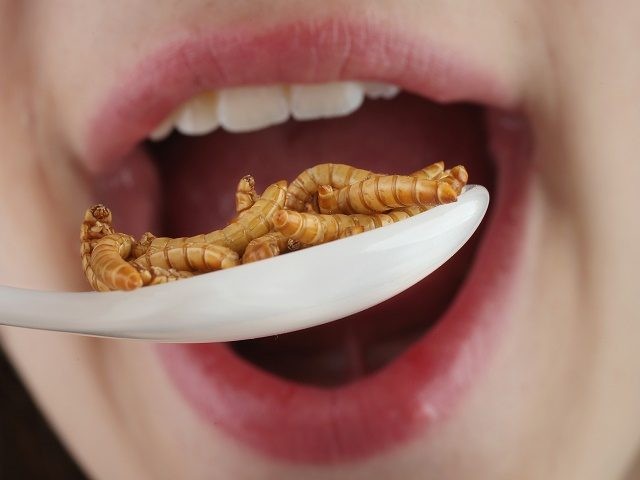Tax-Funded Research: Britons Could Live off Bug Meat by 2030 Because ‘Net Zero’

https://www.breitbart.com/europe/2021/07/30/tax-funded-research-britons-could-live-off-bug-meat-by-2030-because-net-zero/
Burgers made of bugs will replace beef in the British diet within a decade in order to hit the green agenda ‘net zero’ government targets, a Great Reset-style taxpayer-funded review has predicted.
The UK Research and Innovation Council (UKRI) said that meat substitutes made from insects, such as mealworms and crickets, are more environmentally friendly as they require less space and feed compared to traditional bovine burgers.
“Although methane inhibitors in feed could reduce emissions by around 30 per cent, meat is still one of the highest-impact foods,” the UKRI said per The Sun.
The public body, which is funded by the Department for Business, Energy and Industrial Strategy (BEIS), also suggested that Britons could swap their beloved fish with lab-grown seafood-esque products in order to combat over-fishing.
The UKRI went on to say that fried eggs may become a thing of the past as well, claiming that eating two fried eggs per day will equate to the same amount of energy used to heat the average home per month.
The dystopian report questioned: “What will your Friday fish and chips look like in 2030?”
“To close Net Zero Week 2021 we’re looking at how the research we support can help us produce our food in a more climate-friendly way, and how our behaviour and expectations might need to change, too,” the taxpayer-funded quango added.
Prime Minister Boris Johnson has pledged to reduce carbon emissions in the United Kingdom to “net-zero by 2050″. The move would cost the UK over £3 trillion, or £100,000 per household, according to a report from the Global Warming Policy Foundation in February of last year.
The buggy predictions were widely criticised as being “out of touch” with reality, with the Chief Executive of the Countryside Alliance, Tim Bonner, saying: “I’m not sure there will be much of a buzz out there for chomping on fly filled burgers, but there will continue to be a growing appetite for sustainable grass-fed British beef produced by our fantastic farmers.
“UK Research And Innovation appear to be somewhat out of touch with what the vast bulk of people would be prepared to accept.”
A spokesman for the National Farmers Union added: “It’s crucial people are making informed diet decisions based on accurate information; when people buy British meat and dairy they are buying sustainable, local food, produced in areas often where it is difficult to grow other foods.
“The same cannot always be said for some highly processed meat alternatives.
“People should be reassured that if they want to enjoy meat and dairy products and at the same time reduce their carbon footprint – they can.
“British farmers are already leading the way in climate-friendly food and we have an ambition to do even more.”
Users on social media blasted the bugged out plan as well, with technology journalist Mark Sparrow quipping: “How many times does this old chestnut keep popping up? Someone must have invested a fortune in insect farms and is determined we’ll eat bugs after the Great Reset.”
Insects have long been touted by climate change activists as a possible replacement for meat, which they claim negatively impacts the environment. However, eating bugs has remained a niche practice in the West.
The European Union has been at the forefront of trying to push bug burgers in the West, approving beetle larvae for human consumption in May after announcing in January that yellow mealworms were safe to eat.
The nominally conservative British government, for its part, has been considering ever more draconian measures to influence the eating habits of the public, including a tax on sugar and salt and even promoting the idea of a Chinese-style social credit score app that would reward “loyalty points” for buying supposedly healthier groceries.
A spokesman for UKRI claimed that their report was not meant to be taken as a diktat but rather a suggestion, saying: “These are examples of what people might be eating in a Net Zero future. They represent choices people may make, rather than any recommendation on what they should do.”

No comments:
Post a Comment